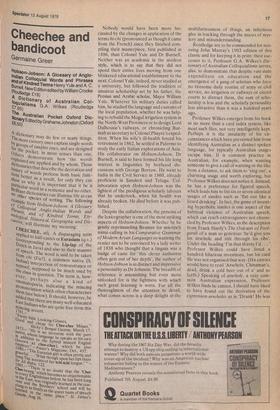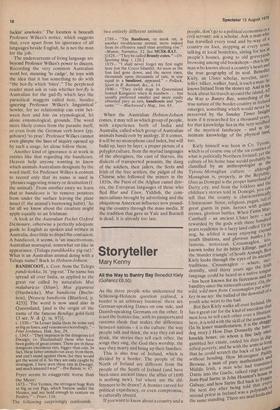Cheechee and bandicoot
Germaine Greer ilobson-Jobson: A Glossary of AngloIndian Colloquial Words and Phrases and of Kindred Terms Henry Yule and A. C.
Burnell. New Edition edited by William Crooke (Routledge 218) A Dictionary of Australian Col
loqUialisms G.A. Wilkes (Routledge £7.95) The Australian Pocket Oxford Dictionary Edited by Grahame Johnston (Oxford 26.50) A dictionary may do few or many things. The More cursory ones explain single words by groups of simpler ones, and are designed _IcIr the pocket, in more senses than one. Others demonstrate how the words explained are applied and by whom. Those dictionaries that describe the derivation and history of words perform both basic functions better as a result, for only they can Show us why it is important that it be a 1.,articular word in a sentence and no other. 1°rilliant dictionaries can illumine life as can 11° other species of writing. The following example from Hobson-Jobson: A Glossary 5 Colloquial Ang1O-Indian Words and Phrases, and of Kindred Terms, Elyemologica4 Historkal, Geographic and Disursive, will illustrate my meaning: QUECHEE, adj. A disparaging term applied to half-castes or Eurasians (q.v.) (corresponding to the Lip-lap of the butch in Java) and also to their manner of speech. The word is said to be taken from chi (Fie!), a common native (S. Indian) interjection of remonstrance or reproof supposed to be much used by the Class in question. The term is, however perhaps also a kind of onomatopoeia, indicating the mincing pronunciation which often characterises them (see below). It should, however, be added that there are many well-educated east Indians who are quite free from this Mincing accent. 1781._
'Pretty little Looking-Glasses, Good and cheap for Chee-chee Misses."
1 Hicky's Bengal Gazette, March 17. ,1.Viv3 -"He is no favourite with the pure iae, Whose language he speaks as his own naddition to the hybrid minced English era ru chee-chee), which he also 1810°Y: Fraser's Magazine, Oct., 437. ace ful,, The Eurasian girl is often pretty and . 'What though upon her lips there ,.,9ng The accents of her tchi-tchl tongue.' "air Ah Baba 122. 1881.,. "There is. no doubt that. the. thee to N.i/luch becomes so objectionable in the l 'nglishman before he has been long East was originally learned in the convent and ,ncl the Brothers' school and will be earned i g to as firmly as the queer turns of speech n the same place." St. James's aZette, Aug 26. Nobody would have been more fascinated by the changes in application of the term chi-chi (pronounced as though it came from the French) since they finished compiling their masterpiece, first published in 1886, than Colonel Yule and Dr Burnell. Neither was an academic in the modern style, which is to say that they did not spend their entire lives moving from one blinkered educational establishment to the next. Colonel Yule, indeed, never studied at a university, but followed the tradition of amateur scholarship set by his father, the Persian and Arabic scholar, Major William Yule. Wherever his military duties called him, he studied the language and customs of the local population, whether he was helping to rebuild the Mogul irrigation system in the North-West Provinces or to design Lord Dalhousie's railways, or chronicling Burmah as secretary to Colonel Phayre's expedition. When his wife's ill-health forced his retirement in 1862, he settled in Palermo to study the early Italian explorations of Asia. His collaborator on Hobson-Jobson, Dr Burnell, is said to have formed his life-long interest in linguistics by boyhood discussions with George Borrow. He went to India in the Civil Service in 1860, already proficient in Sanskrit and Telugu. Collaboration upon Hobson-Jobson was the lightest of the prodigious scholarly labours that he undertook, when his health was already broken. He died before it was published.
Despite the collaboration, the persona of the lexicographer is one of the most striking aspects of Hobson-Jobson. Whether he be gently reprimanding Beames for mis-spelt name-calling in his Comparative Grammar of Modern Aryan Languages or warning the reader not to be convinced by a lady writer of 1838 who thought that a lingam was a badge of caste for 'this clever authoress often gets out of her depth', the author of Hobson-Jobson is as distinct and impressive a personality as Dr Johnson. The breadth of reference is astonishing but even more unlooked for is the lightness with which such great learning is worn. For all the thoroughness of the attention to detail, what comes across is a deep delight in the
multifariousness of things, an infectious glee in tracking through the mazes of mystery and misunderstanding.
Routledge are to be commended for reissuing John Murray's 1903 edition of this classic and for keeping it in print: their successor to it, Professor G.A. Wilkes's Dictionary o f Australian Colloquialisms serves, alas, to demonstrate that despite vast state expenditure on education and the emergence of a gang of scholars who have no tiresome daily routine of army or civil service, no irrigation or railways or circuit courts to distract them, the sum of scholarship is less and the scholarly personality less attractive than it was a hundred years ago.
Professor Wilkes emerges from his book as no more than a card index system, like most such files, not very intelligently kept. Perhaps it is the insularity of his circumstances which have prevented him from identifying Australian as a distinct spoken language, for typically Australian usages escape him. It is common practice in Australian, for example, when wanting someone to give a call of warning or the like from a distance, to ask them to 'sing out', a charming usage and worth exploring, but Professor Wilkes does not notice it. Instead, he has a preference for figured speech, which leads him to list Six or seven identical usages of similes such as 'flat out like a lizard drinking'. In fact, the game of inventing hyperbolic similes is one aspect of the habitual violence of Australian speech. which can reach extravagances not chronicled by Professor Wilkes, as the description from Frank Hardy's The Outcasts of Foolgarah of a man so generous 'he'd give you his arsehole and shit through his ribs'. Under the heading 'I'm that thirsty I'd ... Professor Wilkes could have listed a hundred hilarious inventions, but his card file was not organised that way. (His entries would have to read Arsehole, Chinaman's, dead, drink a cold beer out of a' and so forth.) Speaking of arsehole, a very common Australian expression, Professor Wilkes finds he cannot. I should have liked to have found out the derivation of the expression arseholes as in 'Drunk! He Was
fuckin' arsehoks.' The locution is beneath Professor Wilkes's notice, which suggests that, even apart from his ignorance of all
languages beside English, he is not the man for the job.
The undercurrents of living language are beyond Professor Wilkes's power to discern. Recording the very common Australian
word bot, meaning 'to cadge', he toys with the idea that it has something to do with "the bat-fly which `bites'." The perplexed reader must ask in vain whether bot-fly is Australian for the gad-fly which lays the parasitical maggots called bots, besides , ignoring Professor Wilkes's linguistical howler, for no relationship can exist bet ween bots and bite on etymological, let alone entomological, grounds. The word more likely comes from the parasite itself, or even from the German verb beten (pp. geboten) 'to pray'. Professor Wilkes cannot even glimpse the lines of inquiry opened up by such a usage, let alone follow them.
Another kind of ignorance is at work in entries like that regarding the bandicoot. Heaven help anyone wanting to know
which animals Australians designate by the word itself, for Professor Wilkes is content to record only that its name is used in 'phrases suggesting misery or destitution (f. the animal).' From another entry we learn that to bandicoot is 'to remove potatoes from under the surface leaving the plant
intact (f. the animal's burrowing habit).' So far all we know about the creature might apply equally to an Irishman.
A look at the Australian Pocket Oxford Dictionary, otherwise a perfectly adequate guide to English as spoken and written in Australia, does little to dispel the confusion. A bandicoot, it seems, is 'an insectivorous, Australian marsupial, somewhat rat-like in appearance. (Telugu pandikokku pig-rat).'
What is an Australian animal doing with a Telugu name? Back to Hobson-Jobson: BANDICOOT, s. Corr, from the Telegu pandi-kokku, lit. 'pig-rat.' The name has spread all over India, as applied to the great rat called by naturalists Mus malabaricus (Shaw), Mus giganteus (Hardwicke), Mus bandicota (Bechstein), [Nesocia bandicota (Blanford, p. 425)]. The word is now used also in Queensland, [and is the origin of the name of the famous Bendigo gold-field (3 ser. N. & Q. ix. 97)]. c. 1330.— "In Lesser India there be some rats as big as foxes, and venomous exceedingly."— Friar Jordanus, Hak. Soc. 29.
c. 1343.— "They imprison in the dungeons (of Dwaigir, i.e. Daulatabad) those who have been guilty of great crimes. There are in those dungeons enormous rats, bigger than cats. In fact, these latter animals run away from them, and can't stand against them, for they would get the worst of it. So they are only caught by stratagem. I have seen these rats at Dwaigir, and much amazed I was!" —Iton Batuta, iv. 47.
Fryer seems to exaggerate worse than the Moor:
1673.— "For Vermin, the strongest huge Rats as big as our Pigs, which burrow under the Houses, and are bold enough to venture on Poultry." — Fryer, 116.
The following surprisingly confounds two entirely different animals:
1789.— "The Bandicoot, or musk rat, is another troublesome animal, more indeed from its offensive smell than anything else." —Munro, Narrative, 32. See MUSK-RAT. [1828.— "They be called Brandy-cutes."—Or. Sporting Mag. I. 128.] 1879.— shall never forget my first night here (on the Cocos Islands). As soon as the Sun had gone down, and the moon risen, thousands upon thousands of rats, in size equal to a bandicoot, appeared." — Pollock, Sport in B. Burmah, &c., ii. 14.
1880.— "They (wild dogs in Queensland hunted Kangaroo when in numbers . but usually preferred smaller and more easily obtained prey as rats, bandicoots and 'possums.' " — Blackwood's Mag., Jan. 65.
When the Australian Hobson-Jobson comes, it may tell us which group of people, with experience both of India and Australia, called which group of Australian animals bandicoots by analogy. If it comes,
it will be no monophone card index, but will build up, layer by layer, a proper picture of a polyglot culture, from the myriad languages of the aborigines, the cant of thieves, the dialects of transported peasants, the slang of the soldiers, their jailers, the Scots and Irish of the free settlers, the pidgin of the Chinese who followed the miners in the
1850s, the Farsi of the Afghan camel drivers, the European languages of those who fled Blut und Eisen, Yiddish, the cornmercialisms brought by advertising and the ubiquitous American influence now pounding the country through the mass media. If the tradition that gave us Yule and Burnell is dead, it is already too late.































 Previous page
Previous page